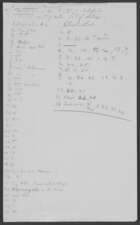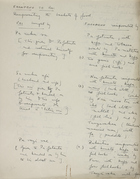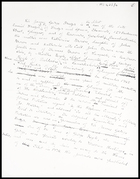Browse Titles - 330 results
Diagram of Food Distribution from Bwaymas (Storehouses)
in Bronislaw Malinowski Papers (Yale), of Yale University. Sterling Memorial Library. Manuscripts and Archives (Field Books Entitled "Hanuabada", Charts, maps and diagrams by Malinowski in the field) (New Haven, CT) (1916) , 2 page(s)
Charts, maps and diagrams by Malinowski in the field; food distribution chart.
Sample
in Bronislaw Malinowski Papers (Yale), of Yale University. Sterling Memorial Library. Manuscripts and Archives (Field Books Entitled "Hanuabada", Charts, maps and diagrams by Malinowski in the field) (New Haven, CT) (1916) , 2 page(s)
Description
Charts, maps and diagrams by Malinowski in the field; food distribution chart.
Date Written / Recorded
1916
Field of Study
Anthropology
Content Type
Field notes
Contributor
Bronisław Malinowski, 1884-1942
Author / Creator
Bronisław Malinowski, 1884-1942
Topic / Theme
Kin groups, Social customs
Copyright Message
Materials sourced from Yale University. Copyright © 2016 by Patrick Burke
×
Disappearing World, The Kalasha: Rites of Spring
directed by John Sheppard; produced by John Sheppard, in Disappearing World (London, England: Royal Anthropological Institute, 1990), 54 mins
The Kalasha are a tribal people, 3,000 strong, who live in the high valleys of the Hindu Kush mountains in the North West Frontier Province of Pakistan. The Kalasha are unique as a pagan people in this Islamic Republic.
Joshi, their three day festival of song and dance, rituals and sacrifice and the re-telling of...
Sample
directed by John Sheppard; produced by John Sheppard, in Disappearing World (London, England: Royal Anthropological Institute, 1990), 54 mins
Description
The Kalasha are a tribal people, 3,000 strong, who live in the high valleys of the Hindu Kush mountains in the North West Frontier Province of Pakistan. The Kalasha are unique as a pagan people in this Islamic Republic.
Joshi, their three day festival of song and dance, rituals and sacrifice and the re-telling of legends celebrates the coming of spring and encourages chivalrous romance between the sexes. All this provides a colourful focus for...
The Kalasha are a tribal people, 3,000 strong, who live in the high valleys of the Hindu Kush mountains in the North West Frontier Province of Pakistan. The Kalasha are unique as a pagan people in this Islamic Republic.
Joshi, their three day festival of song and dance, rituals and sacrifice and the re-telling of legends celebrates the coming of spring and encourages chivalrous romance between the sexes. All this provides a colourful focus for this film which explores the life and customs of the Kalasha. Before the menfolk depart to the high mountain pastures for the goats’ summer grazing they present the women with goats’ milk and bread that has been ritually purified. The women sing their thanks, praise and food and clamour for more. Whilst the men are away, the women stay in the narrow valleys, tending their tiny terraced fields of wheat, maize and millet. The Kalasha are worried that their way of life is under threat. The naively mortgaged land and walnut trees to their Chitrali Muslim neighbours, often in exchange for paltry loands. The Chitralis now covet the profits to be made from exploiting the cedar and holm oak which grow in the Kalasha valleys. The Pakistan government is aware of the problems and would like to safeguard the Kalashas’ existence as a flourishing minority culture and tourist industry. But a future as a ‘zoo people’ within a tourist park does not appeal to the Kalasha. They are happy to welcome tourists at their festivities and they appreciate interest in their customs, but they are pragmatic about its value to them.
Show more
Show less
Field of Study
Anthropology
Content Type
Documentary
Contributor
Peter Parkes, fl. 1990, John Sheppard
Author / Creator
John Sheppard, Peter Parkes, fl. 1990
Date Published / Released
1990
Publisher
Royal Anthropological Institute
Series
Disappearing World
Topic / Theme
Kalasha, Asian ethnic groups, Religious festivals, Kin groups, Elopement, Tribal and national groups, Indigenous peoples, Inuit
Copyright Message
Copyright © 1990 by the Royal Anthropological Institute
×
Document 7B - Kinship Charts
in Bronislaw Malinowski Papers (LSE), of London School of Economics and Political Science. Library. Archives and Special Collections Team (Box 2: Trobriand Islands fieldwork notebooks and notes, Folder 23: Field notes) (London, England) (1925) , 4 page(s)
Four undated pages of numbered kinship charts are headed 'Document 7B' in the upper left corner. Familial relationships are indicated by lines connecting names, along with filled and empty circles. Some charts have brief notes in English.
Sample
in Bronislaw Malinowski Papers (LSE), of London School of Economics and Political Science. Library. Archives and Special Collections Team (Box 2: Trobriand Islands fieldwork notebooks and notes, Folder 23: Field notes) (London, England) (1925) , 4 page(s)
Description
Four undated pages of numbered kinship charts are headed 'Document 7B' in the upper left corner. Familial relationships are indicated by lines connecting names, along with filled and empty circles. Some charts have brief notes in English.
Date Written / Recorded
1925
Field of Study
Anthropology
Content Type
Field notes
Contributor
Bronisław Malinowski, 1884-1942
Author / Creator
Bronisław Malinowski, 1884-1942
Topic / Theme
Kin relationships, Trobriand Islanders
Copyright Message
Materials sourced from Yale University. Copyright © 2016 by Patrick Burke
×
CHAPTER FOUR: Genealogies: Place, Race, and Kinship
written by Jacqueline Brown; in Dropping Anchor, Setting Sail: Geographies of Race in Black Liverpool (Princeton, NJ: Princeton University Press, 2005, originally published 2005), [70]-96
Sample
written by Jacqueline Brown; in Dropping Anchor, Setting Sail: Geographies of Race in Black Liverpool (Princeton, NJ: Princeton University Press, 2005, originally published 2005), [70]-96
Field of Study
Anthropology
Content Type
Ethnography
Contributor
Jacqueline Brown
Author / Creator
Jacqueline Brown
Date Published / Released
2005
Publisher
Princeton University Press
Topic / Theme
Anglo African, British, Social classes, Racial identity, Cultural identity, Communities, African ethnic groups, Kin relationships, Africans
Copyright Message
Copyright © 2005 by Princeton University Press
×
Economic functions
in Bronislaw Malinowski Papers (LSE), of London School of Economics and Political Science. Library. Archives and Special Collections Team (Box 2: Trobriand Islands fieldwork notebooks and notes, Folder 25: Semi archives of Sociology and Tribal Life, 1915-1931) (London, England) (1915) , 11 page(s)
Eleven undated, handwritten pages of notes are headed 'Economic functions.' The notes consist of a detailed description of the main points of economics in relation to kinship, with an emphasis on ownership that includes land tenure and inheritance.
Sample
in Bronislaw Malinowski Papers (LSE), of London School of Economics and Political Science. Library. Archives and Special Collections Team (Box 2: Trobriand Islands fieldwork notebooks and notes, Folder 25: Semi archives of Sociology and Tribal Life, 1915-1931) (London, England) (1915) , 11 page(s)
Description
Eleven undated, handwritten pages of notes are headed 'Economic functions.' The notes consist of a detailed description of the main points of economics in relation to kinship, with an emphasis on ownership that includes land tenure and inheritance.
Date Written / Recorded
1915
Field of Study
Anthropology
Content Type
Field notes
Contributor
Bronisław Malinowski, 1884-1942
Author / Creator
Bronisław Malinowski, 1884-1942
Topic / Theme
Economics, Estates and inheritances, Property rights, Kin relationships, Trobriand Islanders
Copyright Message
Materials sourced from Yale University. Copyright © 2016 by Patrick Burke
×
[Extract from] Die Bergdama, (by) H. Vedder, 1923
in Margaret Mead Papers and South Pacific Ethnographic Archives, 1838-1996, of United States. Library of Congress. Manuscript Division (N103: Papua New Guinea, Folder 2: New Guinea. Arapesh, Mundugumor, and Tchambuli. Mead and Fortune field trip, 1931-33. Postfield materials. Mundugumor. Proposed book on Mundugumor, 1973. Notes and other reference materials folder #2) (District of Columbia), in Hamburgische Universität. Abhandlungen aus dem Gebiet der Auslandskunde, Reihe B: Volkerkunde, Kulturgeschichte und Sprachen, Band 7, 1923, pp. 46-50 (1923), 7 page(s)
**The image(s) of the document may be omitted here because of copyright considerations** A five-page extract -- along with cover and title page -- from the article "Die Bergdama", authored by Heinrich Vedder, published 1923 in German in a Hamburg University publication, 'Abhandlungen aus dem Gebiet der Auslandskun...
Sample
in Margaret Mead Papers and South Pacific Ethnographic Archives, 1838-1996, of United States. Library of Congress. Manuscript Division (N103: Papua New Guinea, Folder 2: New Guinea. Arapesh, Mundugumor, and Tchambuli. Mead and Fortune field trip, 1931-33. Postfield materials. Mundugumor. Proposed book on Mundugumor, 1973. Notes and other reference materials folder #2) (District of Columbia), in Hamburgische Universität. Abhandlungen aus dem Gebiet der Auslandskunde, Reihe B: Volkerkunde, Kulturgeschichte und Sprachen, Band 7, 1923, pp. 46-50 (1923), 7 page(s)
Description
**The image(s) of the document may be omitted here because of copyright considerations** A five-page extract -- along with cover and title page -- from the article "Die Bergdama", authored by Heinrich Vedder, published 1923 in German in a Hamburg University publication, 'Abhandlungen aus dem Gebiet der Auslandskunde' (roughly translated, Papers from the field of Cultural Studies) by L. Friederichsen & Co. Extracted sections concern family and nam...
**The image(s) of the document may be omitted here because of copyright considerations** A five-page extract -- along with cover and title page -- from the article "Die Bergdama", authored by Heinrich Vedder, published 1923 in German in a Hamburg University publication, 'Abhandlungen aus dem Gebiet der Auslandskunde' (roughly translated, Papers from the field of Cultural Studies) by L. Friederichsen & Co. Extracted sections concern family and naming conventions among the Damara people of Namibia.
Show more
Show less
Field of Study
Anthropology
Content Type
Essay
Contributor
Heinrich Vedder, 1876-1972
Author / Creator
Heinrich Vedder, 1876-1972
Date Published / Released
1923
Topic / Theme
Kinship nomenclature
×
Failauga
in Margaret Mead Papers and South Pacific Ethnographic Archives, 1838-1996, of United States. Library of Congress. Manuscript Division (N2: American Samoa, Folder 3: Mead field trip, 1925-26. Field data. Notes-field work sheets) (District of Columbia) (1925) , 2 page(s)
Undated handwritten notes by Margaret Mead titled 'Failauga,' giving two columns of numbered lists with names and other letters and numbers, with the second column titled 'Relationship.' The notes are written on the back of a blank dispensary form.
Sample
in Margaret Mead Papers and South Pacific Ethnographic Archives, 1838-1996, of United States. Library of Congress. Manuscript Division (N2: American Samoa, Folder 3: Mead field trip, 1925-26. Field data. Notes-field work sheets) (District of Columbia) (1925) , 2 page(s)
Description
Undated handwritten notes by Margaret Mead titled 'Failauga,' giving two columns of numbered lists with names and other letters and numbers, with the second column titled 'Relationship.' The notes are written on the back of a blank dispensary form.
Date Written / Recorded
1925
Field of Study
Anthropology
Content Type
Field notes
Contributor
Margaret Mead, 1901-1978
Author / Creator
Margaret Mead, 1901-1978
Topic / Theme
Kin groups, Samoans
×
Fakapenu te Vai: Reciprocating the Baskets of Food
in Raymond William Firth Papers, of London School of Economics and Political Science. Library. Archives and Special Collections Team (Tikopia and Solomon Islands Other, Funeral Economics) (London, England) (1933) , 8 page(s)
Handwritten notes, titled "Fakapenu te Vai: Reciprocating the Baskets of Food," circa 1933, re: gift-giving as part of funeral rituals. Firth lists gifts, with givers and those reciprocating, and the reason for each, along with notes further explaining the complicated exchange process.
Sample
in Raymond William Firth Papers, of London School of Economics and Political Science. Library. Archives and Special Collections Team (Tikopia and Solomon Islands Other, Funeral Economics) (London, England) (1933) , 8 page(s)
Description
Handwritten notes, titled "Fakapenu te Vai: Reciprocating the Baskets of Food," circa 1933, re: gift-giving as part of funeral rituals. Firth lists gifts, with givers and those reciprocating, and the reason for each, along with notes further explaining the complicated exchange process.
Date Written / Recorded
1933
Field of Study
Anthropology
Content Type
Field notes
Contributor
Sir Raymond Firth, 1901-2002
Author / Creator
Sir Raymond Firth, 1901-2002
Topic / Theme
Family lineages, Gifts and gift-giving, Death, Funerals, Tikopia
Copyright Message
Material sourced from the Sir Raymond William Firth Collection, LSE Library. Used with permission of the LSE Library and the Raymond Firth Estate.
×
Family History
in Margaret Mead Papers and South Pacific Ethnographic Archives, 1838-1996, of United States. Library of Congress. Manuscript Division (N120: Omaha Indians, Folder 3: Mead and Fortune field trip, 1930. Field data. Notes. M. Mead. Note cards #2) (District of Columbia) (1930) , 2 page(s)
Undated handwritten field note, beginning with an index card divider tab labeled 'Family history.' The note is written on unlined perforated note paper and is headed 'family hist.' The note discusses a 'half breed' and places where family members lived.
Sample
in Margaret Mead Papers and South Pacific Ethnographic Archives, 1838-1996, of United States. Library of Congress. Manuscript Division (N120: Omaha Indians, Folder 3: Mead and Fortune field trip, 1930. Field data. Notes. M. Mead. Note cards #2) (District of Columbia) (1930) , 2 page(s)
Description
Undated handwritten field note, beginning with an index card divider tab labeled 'Family history.' The note is written on unlined perforated note paper and is headed 'family hist.' The note discusses a 'half breed' and places where family members lived.
Date Written / Recorded
1930
Field of Study
Anthropology
Content Type
Field notes
Contributor
Margaret Mead, 1901-1978
Author / Creator
Margaret Mead, 1901-1978
Topic / Theme
Family lineages, Omaha-Ponca
×
Family History of Sir James George Frazer
written by Robert Angus Downie, 1905-, in Downie, R. Angus Collection, of Royal Anthropological Institute. Archives and Manuscripts (1900) , 3 page(s)
Sample
written by Robert Angus Downie, 1905-, in Downie, R. Angus Collection, of Royal Anthropological Institute. Archives and Manuscripts (1900) , 3 page(s)
Date Written / Recorded
1900
Field of Study
Anthropology
Content Type
Field notes
Contributor
Robert Angus Downie, 1905-
Author / Creator
Robert Angus Downie, 1905-
Person Discussed
James George Frazer, 1854-1941
Topic / Theme
Scottish, Family lineages, Scots
×

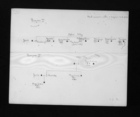
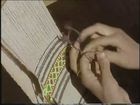
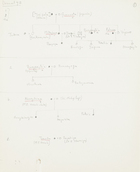

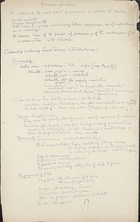
![[Extract from] Die Bergdama, (by) H. Vedder, 1923 [Extract from] Die Bergdama, (by) H. Vedder, 1923](https://d3crmev290s45i.cloudfront.net/content/1008654xxx/1008654551/1008654551-size-exact-140x0.jpg)
